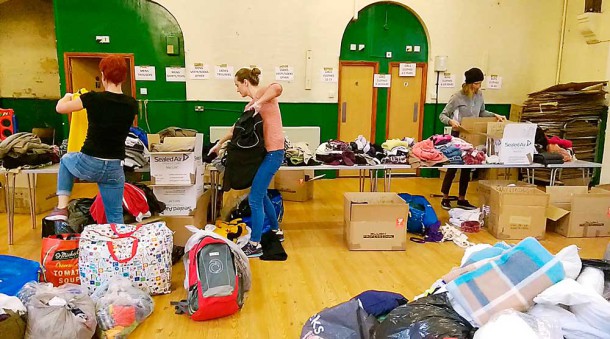
Brixton resident Kate Coggins has created a movement across South London mobilising aid for refugees in Calais, Greece and Italy. Helen Reid spoke to her.
The joint effort of Brixton, Clapham and Herne Hill residents to provide tonnes of clothes, food and hygiene items is an example of how small initiatives can bloom into large community-wide efforts.
The number of refugees in Calais is estimated at between 2,000 and 5,000, but is a small fraction of the 230,000 that have arrived in Greece and the 115,000 in Italy this year. Kate decided on August 27, inspired by friends who were visiting Calais, to take action.
She created a Facebook group to coordinate support for refugees, joining the Calais Action charity. “I just felt it was the right thing to do,” she says. “I didn’t want to just be sending £5 to charity, I wanted to roll up my sleeves and do something.”
Initially involving 200 friends, the group quickly grew and a watershed was reached on September 3 with the widely published photograph of Syrian boy Alan Kurdi washed up on a Turkish beach. The three-year-old had drowned as he and his family attempted to reach the Greek island of Kos.
Kate received at least 500 emails that day alone.
I met Kate in the huge St Anne’s Hall on Venn Street in Clapham, where donations collected from thousands of people over the past two weeks are stored.
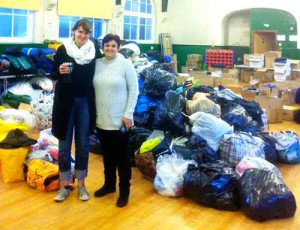
Diane Grano, the community missioner of Holy Trinity Church, tells me the church is proud to contribute the hall space to the effort.
Volunteers come here from diverse postcodes and all walks of life to sort items into boxes, united by their desire to give a few hours of their time, or a few surplus items, to the cause.
The donations do not stop at food and clothing. “Refugees have psychological needs as well as physical,” Kate emphasises, and she plans to ship music systems, books and toys to Calais.
This is Kate’s first foray into organizing. She says she “hasn’t done anything like this since the girl guides”.
She is modest about the scale of the movement she has created. She began her campaign only two weeks ago, and already more than 4,000 people are attending her event on Facebook, and two volunteers help her moderate the event and deal with a steady stream of emails.
Kate is usually a freelance film editor, but the Calais effort has become a “full-time job”. She is not, however, working single-handedly or ad hoc – she is using existing infrastructures and charities with local knowledge in order to contribute to the cause: “We want to make sure we minimise waste, and so we’re getting very targeted information about what is needed.”
“People say charity begins at home, but I think it should be on all fronts,” Kate says. In full knowledge that the refugees in Calais represent the tip of the iceberg, she is also working with the Clapham charity In-Visible to organise shipments of food and clothes to Greece and Italy. Shipment company Mail International, based in Burgess Hill, West Sussex, approached her and offered her 1.3 tonnes of free shipping to transport aid to refugees in Greece.
Other companies have also answered the call for help: Brixton Brewery donated packing boxes as well as beers to keep volunteers going through hours of sorting and packing.
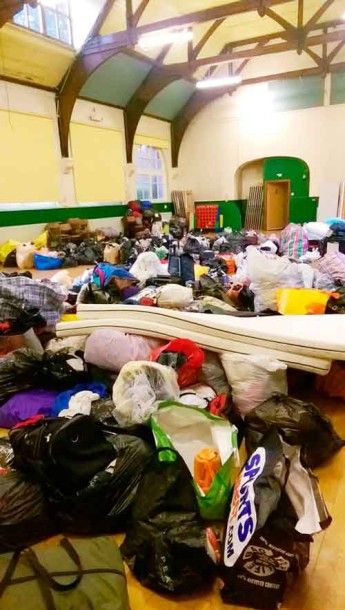 The effort has brought the community together. Kate has met neighbours she had never seen before: “They came out onto the street on Saturday when I had boxes spilling out of my flat, to ask what I was doing, and offered their help. To see the heartbeat of the community is incredible,” adds Diane.
The effort has brought the community together. Kate has met neighbours she had never seen before: “They came out onto the street on Saturday when I had boxes spilling out of my flat, to ask what I was doing, and offered their help. To see the heartbeat of the community is incredible,” adds Diane.
The internet also enables a new level of closeness to those they are aiming to help: “The amazing thing about Facebook is that people in Syria are communicating with us directly”.
A direct and tailored form of aid is more possible today than ever before, yet many well-meaning people are simply dumping unwanted items in Calais without connecting with local infrastructures.
“It’s important to give what there is a need for, rather than simply what we want to get rid of,” says Diane. Part of the problem with ad hoc donations is that they are not organised or labelled. “It shouldn’t be getting to Calais like this, it should be getting there in boxes already sorted.”
Kate and Diane show me boxes neatly labelled in English and French. “We’re also making sure we sort clothes into small, medium and large, as much as possible. It’s not how quick we can get it out, it’s getting it done properly so that it’s more effective.”
Grassroots efforts are often criticised for being inefficient and badly organised, but Kate’s effort is an example of grassroots organising which uses pre-existing infrastructure intelligently to give what there is a need for.
She and her volunteers say they are fighting the tendency for charity to be more about the guilt (and gratification) of the giver than about the real needs of the recipients of aid.
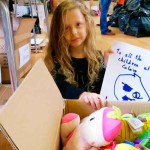 The biggest need currently is for firewood, weather-proof gear and packing boxes. If you are able to contribute any of these items please drop them at St Anne’s Hall, Venn Street, Clapham, SW4 0BN.
The biggest need currently is for firewood, weather-proof gear and packing boxes. If you are able to contribute any of these items please drop them at St Anne’s Hall, Venn Street, Clapham, SW4 0BN.


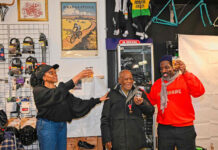
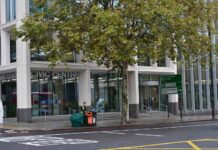
Hi, please call me if u need food for yourself or other refugees as I know where to get loads of free tasty food in north London every evening close by the Finchley – this is the only way that I can help with this info but I don’t have much time to put in as I am starting up my own business and charity starts at home – wish I could help more, but this is the best I can do now – to donate my knowledge!
Thanks,
Alexandra
07841530814
Hello, I can provide a lot of absolutely decent warm jumpers but does the word “weatherproof” suggest you really need waterproof stuff? I could also do boots, plimsolls etc.
But I don’t want to dump a load of things on you that are not needed.
Also..I don’t have a car currently so do you think you’ll be doing any evening collections?
Lucy